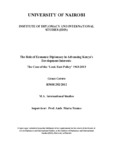| dc.description.abstract | The end of the cold war triggered a reversal in the political and commercial
polarity of the world. There have been a series of shifts from the ideological East-
West divide that defined states within an either capitalist or communist framework
that relied principally on political structure to define economic inclinations to one
defined largely by economic interests. In other words, economic considerations
appear to define political decisions rather than the other way around. As a result, there
has also been a change in the nature of diplomatic relations among states shifting
from the conventional military-political concerns that characterized the cold-war
years to economic interests dominating the post cold-war era. Nominally, it is
observed that the current iteration of global polarization is North-South, pitting
developed against developing economies. Amongst the developing countries, the
Eastern and Southern Asian regions specifically China and India are registering
unprecedented rates of growth. The awakening of these eastern ‘tiger’ and ‘dragon’
economies is one of the drivers of increased Afro-Asian commercial and diplomatic
exchanges and is a testament to the new trends in South-South relations. | en_US |

